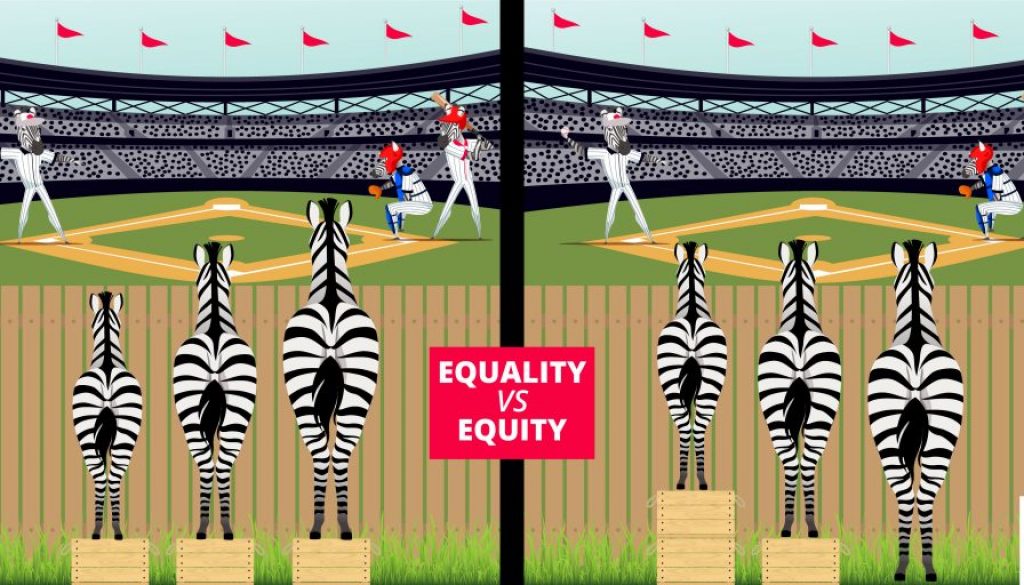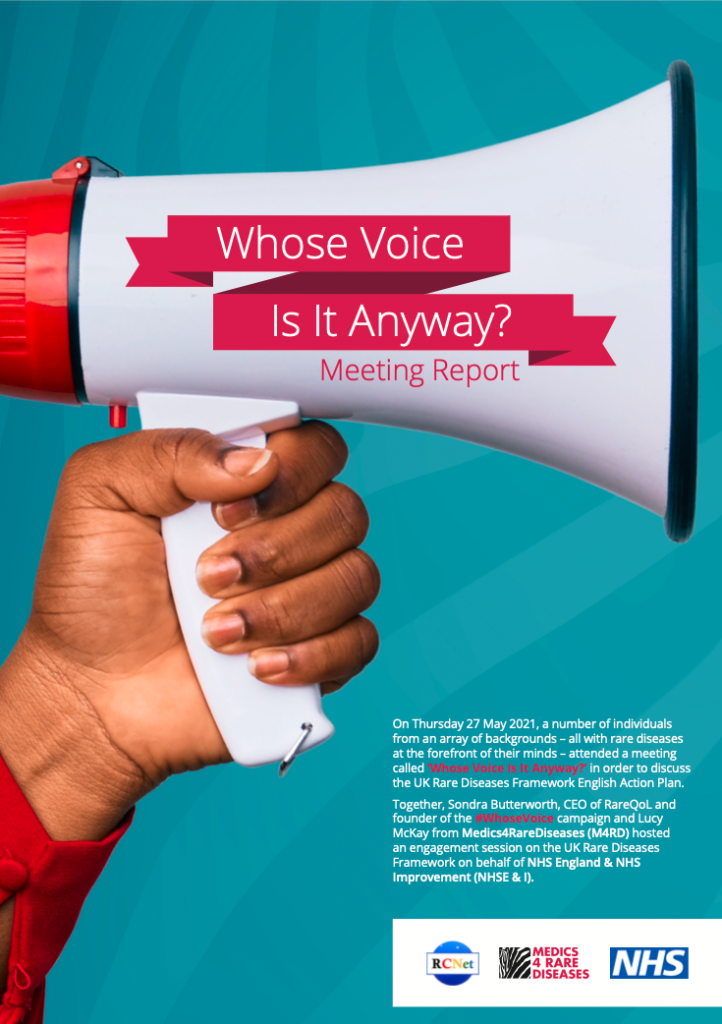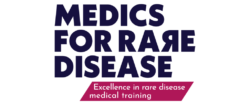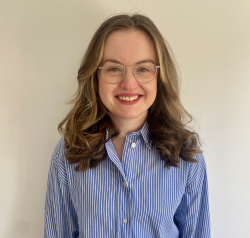Whose Voice Is It Anyway?
On Thursday 27 May 2021 Sondra Butterworth, CEO of RareQoL and founder of the #WhoseVoice campaign, and Lucy McKay from M4RD hosted an engagement session on the UK Rare Diseases Framework and the England Action Plan on behalf of NHS England (NHSE) and NHS Improvement (NHSI). Today the report has been published and you can access it by clicking below.
Introduction
‘Whose Voice is it Anyway’ is a campaign by Rare Community Network to draw attention to the voices of those who are often under-represented in discussions about issues that affect the rare disease community. M4RD is proud to support the #WhoseVoice campaign in drawing attention to the lack of diverse voices being heard.
The meeting
After an introduction from Lucy McKay, Sondra Butterworth introduced the delegates to the #WhoseVoice campaign and the ‘theories of need’.
She discussed ‘expressed need’, which is associated with the patient voice and compared this with ‘assessed need’, which is associated with the healthcare system. There is currently a mismatch in society, with assessed need taking priority over expressed need. Going forward, a co-production approach is key in trying to reach equilibrium.
There seems to be an imbalance in power with medical professionals having most of the power and patients having less.
Dr Sondra Butterworth
Fiona Marley, Head of Highly Specialised Commissioning for NHSE presented a background on the UK Rare Diseases Framework and NHSE’s role in delivering the ‘Action Plan’. She explained that each UK nation develops its own action plan. This meeting was being run to discuss and identify themes and how improvements can be made and taken into consideration for England’s action plan.
NHSE’s Emerging Themes:
- Ensuring a good fit of rare disease services with the proposals set out in the White paper. Integration and innovation: working together to improve health and social care for all
- Reduction in health inequalities
- Improving access to drugs
- Patients with undiagnosed conditions
- Provision of good quality virtual care where clinically appropriate and other initiatives that support care close to home
- Continued innovation in genomics
These emerging themes aren’t the only themes that NHSE are exploring and this meeting was part of understanding what else needs consideration.
The priorities of The UK Rare Diseases Framework:
- Helping patients get a final diagnosis faster
- Increasing awareness of rare diseases among HCPs
- Better coordination of care
- Improving access to specialist care, treatments and drugs
Andrew Stewart, Communications Manager for Specialised Commissioning for NHSE & I, elaborated on the need to develop a successful Action Plan. Andrew explained how a ‘tag-team’ approach between themselves and the DoH is necessary in order to establish the best possible Action Plan for England. Everybody in attendance had the same common goal: to create change and ensure the Action Plan encompasses specific recommendations that are informed by those who may not otherwise have a platform on which to have their experiences or voices heard.
A new emerging theme: equity vs equality

Equity was a dominating theme of the remainder of the meeting, particularly the difference between equality and equity. Social Change UK nicely summarise the interplay between the two: “The difference between equality and equity must be emphasised. Although both promote fairness, equality achieves this through treating everyone the same regardless of need, while equity achieves this through treating people differently dependent on need. However, this different treatment may be the key to reaching equality”.
Striving for health equity doesn’t mean providing the same services for everybody, it’s about having appropriate services for our diverse community
Kerry-Leeson Beevers
Tackling the priorities
Attendees were separated into three breakout groups for Priorities 1, 3 and 4 respectively. Sondra emphasised to attendees that it is the patient voice that must underpin the action national action plans. Lucy McKay explained that healthcare professional awareness (Priority 2) is fundamental to success in the other three priority areas. This should be woven into discussions for all Priority groups, rather than be discussed in isolation.
Awareness amongst healthcare professionals needs to be integral to all areas of the UK Rare Diseases Framework and action plans, just like the patient voice
Dr Lucy McKay
Lucy, Sondra and Fiona facilitated each group and participants were asked to provide their insight into the Priorities and to discuss the emerging themes.
The questions to think about whilst engaging in discussions:
- Do these themes reflect the expressed needs of the rare disease community?
- Is anything crucial missing from these themes?
- How will HCP awareness benefit this priority and these themes?
- What specific ways can be suggested to use the patient voice in the designing of services?
A different discussion
This was a new group of people that haven’t been brought together in one room before, many of whom have never been personally involved in formal consultation of this kind. As a result new points of view were heard and new insights could be learned from.
Youth participation in rare and chronic condition healthcare settings is fundamental to service design and delivery…
Laurence Woolard
The participants engaged in fruitful dialogue, using their backgrounds and personal experiences to contribute their viewpoints to the discussion.
The Banglasdeshi and Pakistani communities that I work with in London are often labelled hard to reach, but that’s based on assumptions rather than knowledge
Dr Shwetha Ramachandrappa
Summary
At the end of the breakout discussions, all delegates returned to the main meeting. A spokesperson for each breakout group shared the key themes and discussions from their group. Many of the areas that the group felt could be improved upon reflect the fundamentals of good medical practice: excellent communication, culturally competent workforce and patient-centred care.
We need an open and plain channel of communication that goes both ways between patients and healthcare professionals. It needs to be very clear. It needs to be very well understood and not just a tick box exercise
Dr Pushpa Hossain
M4RD, Rare QoL and NHSE are all extremely grateful for the proactive nature of all delegates and are hopeful that these themes can be fed through into England’s Action Plan.
Pass the power and you will hear the voice
#whosevoice
Appreciation
On behalf of all meeting facilitators, we would like to extend a huge thank you to all the delegates that participated in the ‘Whose Voice Is It Anyway?’ meeting. Every delegate brought their experience and expertise to the table and helped us engage in such fruitful, constructive, and open exchanges to help provide insight into the Priorities outlines in the Framework.
M4RD would also like to extend a BIG THANK YOU to emotive for helping the team facilitate this meeting and for creating the report. emotive is a global healthcare communications agency who create inspiring medical communications. The team have been supporting M4RD with pro bono work for three years now and they continue to be integral to the charity’s success.
M4RD would like to thank its 2021 sponsors who have made this work possible. Please find out more here.





